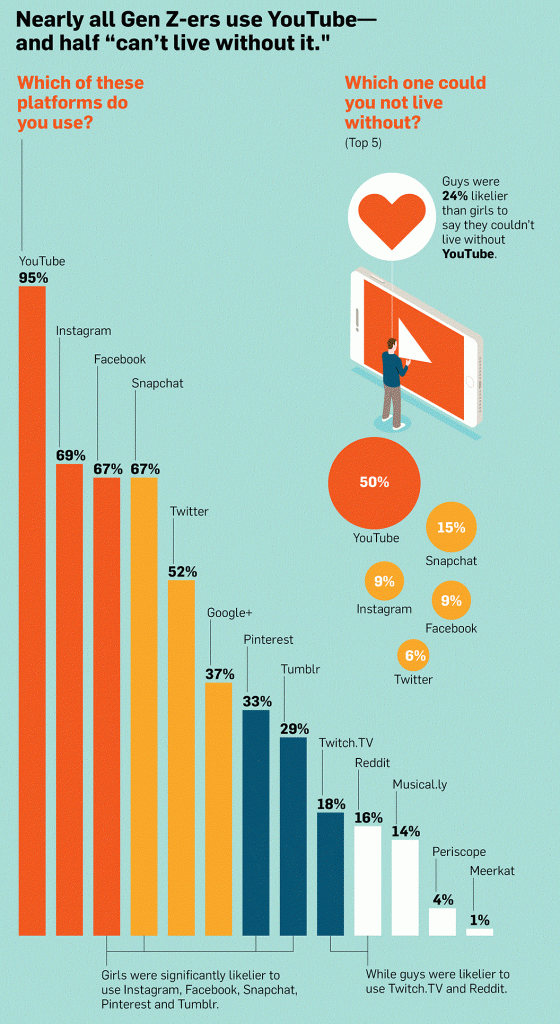How higher education can engage with Generation Z online
Generation Z, born between the mid-1990s and 2010, grew up in an entirely digital world. Thus, it comes as no surprise that this generation is increasingly active on all kinds of social media channels, such as YouTube, Facebook and Snapchat. In our last article about Gen Z, we discovered that they are more motivated than ever to study abroad. For institutions, this offers a valuable opportunity to target prospective students not only on their website, but to adapt to a multi-channel strategy with a focus on social media in order to reach out to them. Social media channels are particularly useful towards the end of the study choice journey, when students compare multiple study options they have shortlisted, or have already received their confirmation letter and are trying to envision life on campus.
For Gen Z, social media is an important way to interact and connect with friends in order to share the latest news and happenings. Interestingly, high school students are increasingly using the online platforms to research information about higher education institutions to gather tips and help them decide where to enrol. Your university can take advantage of this search behaviour by establishing a solid online presence and providing the digital natives with the information they are looking for.
Social media use by Gen Z
However, not every online platform gains the same popularity among Gen Z. We stumbled across an infographic that shows which social media channels are used the most: YouTube is used by a stunning 95% of Gen Z-ers, and half of the asked high school students indicated that they cannot live without the video-sharing website. A significantly smaller but still impressive number uses Instagram, Facebook, and Snapchat to connect with other users. For the digital natives, however, social media goes far beyond entertainment only. They use social media to get educated, relief stress, and identify themselves with other users, bloggers and vloggers (video bloggers). Even though the mentioned platforms are the four most popular among Gen Z, it is not advisable to embed all channels in your recruitment strategy that are out there. That’s why institutions are required to choose their channels wisely to be able to attract the right target group. Settling for only a few networks can increase the effectiveness and success of your social media activities because you are able to match and target the interest of a particular group of prospective students.
Source: www.adweek.com
Understanding the need for information
Even though social media is an effective way to communicate your study programme offerings, you should keep in mind that students are online to connect and exchange information. Thus, providing valuable content for Gen Z is a crucial step in sparking interest. Showing your prospective students how campus life at your institution looks like, showcasing student and faculty work, and giving them the opportunity to connect with other students and alumni gives them a first glimpse of how it is to be an enrolled student at your university. When creating content, you should emphasise on the information the study seekers want to receive rather than only providing them with all the details and facts about your study programme. Social media serves as a network to interact with other users. Therefore, building a dialogue instead of a monologue with Gen Z fosters engagement and increases their interest.
Gaining the interest of Gen Z can be challenging as the digital natives are cluttered with an online information overload. That’s why your institution needs to understand its target groups to provide content that catches interest and stands out from the competition. Developing an online strategy with measurable goals helps to clarify which group of prospective students you want to target, what kind of content will be posted at what time, and how you can increase engagement in order to create a dialogue and electronic word-of-mouth.
Going online and being active on social media is crucial in today’s international student recruitment efforts. Thus, choosing the channels that fit your target group and institution helps you to develop a sound online strategy. In that way, students receive the information they need to decide where to enrol. Establishing your social media channels has not only advantages for students, it also allows you to learn as much as possible from the digital natives and offer the level of customer service that they have come to expect, and allows institution to delight students making a final choice for the university that best matches their dreams and aspirations.
For more updates, follow us!







